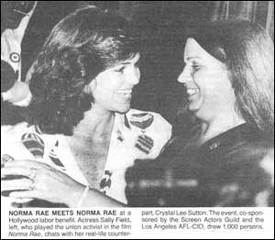
In the 1960s and early 1970s, textile workers in North Carolina inspired labor and workers everywhere with their successful assault on the Southern, non-union fortress, built by JP Stevens. In 1967, the Steven’s sweatshop empire included 44,000 workers in 85 plants, mostly in the Carolinas. The critical union victory came when 3,000 textile workers at Stevens’ flagship Roanoke Rapids mills won union recognition in 1974.
That union foothold took over ten years of constant struggle. It took concentrated and permanent commitment from the textile workers union, intense grassroots organizing by rank and file Stevens workers and boycott solidarity from labor and community activists.
Crystal Lee Sutton, in particular, captured people’s imagination. Sutton’s outstanding and dramatic role in the victory also inspired a book and the award winning movie, “Norma Rae.” As a 33-year-old mother of three, who earned $2.65 an hour, Crystal Lee was fired for her union activity. As the movie immortalized, she was fired for challenging a racist ploy by Stevens management. While the movie changed her name for legal reasons, Sutton really did write union on a piece of cardboard and climb on a table holding it up and turning around the factory slowly. And her fellow workers did shut off their machines in solidarity.
“It is not necessary I be remembered as anything,” Crystal Lee said in an interview, “but I would like to be remembered as a woman who deeply cared for the working poor and the poor people of the U.S. and the world.”
Sutton continued that battle throughout her life. Then diagnosed with brain cancer several years ago, she began a battle for her life with her health insurance company. For several critical months the insurance company denied her claim for expensive drugs that could have saved her life. Though they finally gave-in and agreed to pay for the drugs, the cancer had set in and led to her death.
Sutton was quoted in the Burlington (N.C.) Times-News last year saying the insurer’s behavior was an example of abuse of the working poor:
“How in the world can it take so long to find out [whether they would cover the medicine or not] when it could be a matter of life or death,” she said. “It is almost like, in a way, committing murder.”
We can’t help but feel that Crystal Lee Sutton would have responded to the health care reform struggle with the same kind of fighting spirit that inspired Mother Jones to proclaim, “Mourn for the dead, but fight like hell for the living.”












Comments